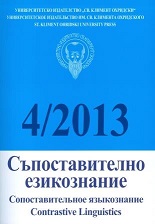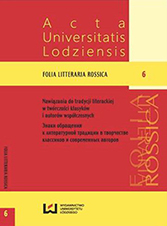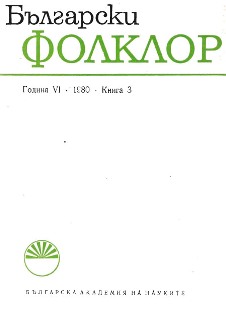


This paper offers a unified account of the phonological aspects of morpholexical and morphosyntactic processes such as compounding, affixation and cliticisation which often lead to mismatches between morphological and prosodic constituency. In the Prosodic phonology framework these three processes can be illustrated by three possible operations according to the nature and the combinatorial proprieties of the morphemes in the language under consideration, but also according to the degree of cohesion between stems, bound roots, affixes and clitics: splitting in two phonological words, adjunction or incorporation in the phonological word. This claim is supported and illustrated by data from English, Classical Latin, Italian, Neapolitan, Modern Greek, Dutch, Japanese, Ossetic and Southern Paiute.
More...
ANNIVERSARIES
More...
The paper deals with the usage of possessive verbs as auxiliaries or with the function of modal verbs in some Slavic languages. Such usages are typical not only of the Slavic verb имэти ‘have’, but also of дати_‘give’ and вьзенти_‘take’. The need to analyse the semantic development of the possessive verbs in a historical and synchronic aspect is stressed.
More...


Keywords: N. M. Karamzin; J.-J. Rousseau; reminiscences; literary tradition;
The article is devoted to the study of reminiscences from J.-J. Rousseau’s works in the novel The Letters of a Russian Traveller by N. M. Karamzin. They are studied as an entire, organized artistic system, linked with the concept of literature shaped in Karamzin’s works in the end of 1780– 1790 years, as well as with writer’s thoughts about the other philosophical, aesthetic problems. ‘Rousseau’s plot’ in the novel by N. M. Karamzin is developing in parallel with other additional plots, which resulted in forming a forward-looking dynamic poetic manner of narration in the book.
More...
Keywords: plot; Russian lyric; study room
The article presents a study of the typical lyrical plot, representing the hero-poet in his study room. Comparative analysis of Russian lyric poems of different genres (elegy and others) and authors (Batyushkov, Pushkin, Fet, Polonsky and others) reveals the certain traditions in evolution of this plot – in comparison with the similar tradition in novel (investigated earlier by N. Nyagolova). In the beginning of 20th century these traditions can be observed in Bunin’s poetry and two poems of I. Annensky and N. Gumilev.
More...
Keywords: Carmen; Silver Age; intersemiotic relationship
The aim of this article is to analyze two literary works of the Silver Age that are the poetic interpretation of Carmen story: the poem Carmen by A. Blok and the verse “Carmen” by I. Severyanin. Analyzing both literary works we pointed on different motives from the novel by Merimee and the opera by Bizet. We noticed that Blok and Severyanin not only simply had used well known situations but also had proposed their own interpretation of Carmen based on the intersemiotic relationship between literature, music and opera art.
More...
Keywords: tradition; dialogue links; implications; key motifs; reminiscences
The goal of the present essay is to reveal Lermontov references in Vampilov’s play Duck Hunt. The analysis is carried out on the basis of the key motifs, allusions, reminiscences and structural models referring to A Hero of our Time and Lermontov’s lyrics.
More...
Keywords: Alexander Pushkin’s dramaturgy; the latest Russian drama; the classics and the present day; the game of poetics.
The reception of Alexander Pushin’s ‘little tragedy’ Mozart and Salieri – that was originally meant as a dramatic study of envy – by the Russian literary and theatre scholars, has tended to move in the direction of exhibiting two types of artistic creators: Mozart – the genius, an artist with a Godgiven talent, and Antonio Salieri – the craftsman-composer who practices his musical craft with great skill and, moreover, to using sensational plot devices, such as murder committed out of envy, and the eruptions of human passions and emotions. The authors of the latest versions of Mozart and Salieri, Nikolai Kolyada and Olga Boguslavskaya, make reference to the romantic original work by employing a model situation of contrasting two different types of artists, their opinions on the essence of art (brilliance and genius), and their disposition and ethical principles. They fill in the Pushkin’s pattern with the realities of artistic life in modern Russia. The authors use familiar quotations, situations and selected motifs and submit them to the conventions of the game, typical of the poetics of intertextuality. Thanks to the convention of the game (swapping roles, introducing contemporary themes, such as the role of cultural policy and television in building artistic careers), they manage to avoid the pathos and philosophical stigma of the original, providing, instead, a socio-cultural image of the creative individual’s fate in modern times.
More...
Keywords: Alexander Kushner; concept being; acmeist tradition
The originality of the subject is the usage of the category of a concept as a conceptual metaphor which is an attempt to approach the reality and a part of the author’s vision of the world. In the article the author actualizes semantic gradations of concept being in the lyrics of Alexander Kushner. The analysis shows that this concept is realized in different images and motifs, becoming the dominant of Kushner’s poetics. The semantic field of the concept includes such meanings as things/objects of the surrounding world, the artifacts of culture, (everyday) life.
More...
Keywords: underground poetry; idiolect; poetry school; emigration; paradox; semantics
The main purpose of this article is to present the scientific community of the Lvov poetry school and to describe its history, members and the main concepts of their poetic manner.
More...
Keywords: study room; locus; novel; poetics; semiotics
The article discusses the semiotic parameters of the locus of the study room in the Russian novel from the second half of the 19th century. It outlines the socio-cultural context that makes this locus topical in the works of the Russian novelists from the epoch after the reforms. The given examples of presence of the study room in the novels of I. Turgenev, I. Goncharov, F. Dostoevsky and L. Tolstoy are interpreted in several principle aspects: – objects in the composition and its selection – the relation character – material detail – semantic transformations and their motivation.
More...
Keywords: Serbian lietarature; periodicals of Bosnia-Hercegovina during Austro-Hungarian Monarchy
More...Keywords: Branko Ćopić;
More...Keywords: Srebren Dizdar
Book Review on Srebren Dizdar: Na putevima promjena: osobenosti razvoja književnog djela Ngugi Wa Thiong’oa (Buybook, Sarajevo, 2004)
More...Keywords: Balkan; socialist realism; Derviš Sušić
More...